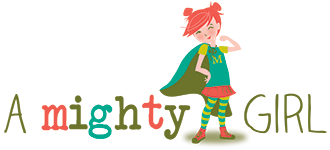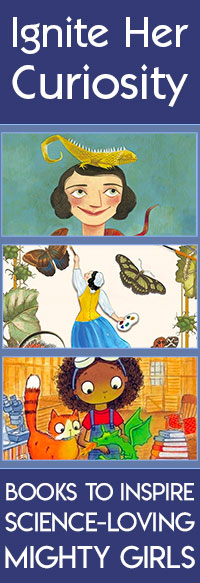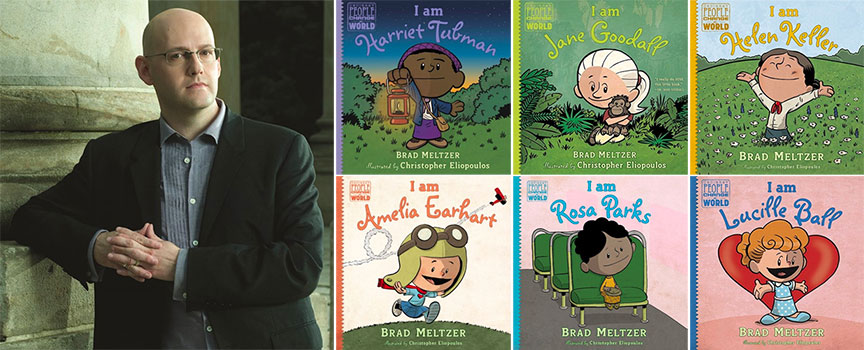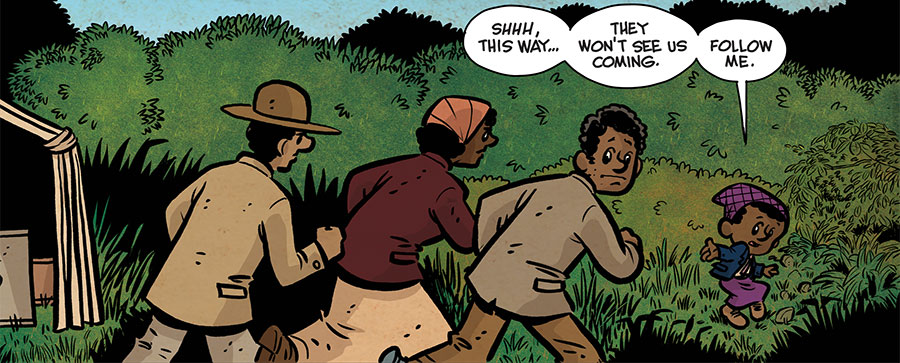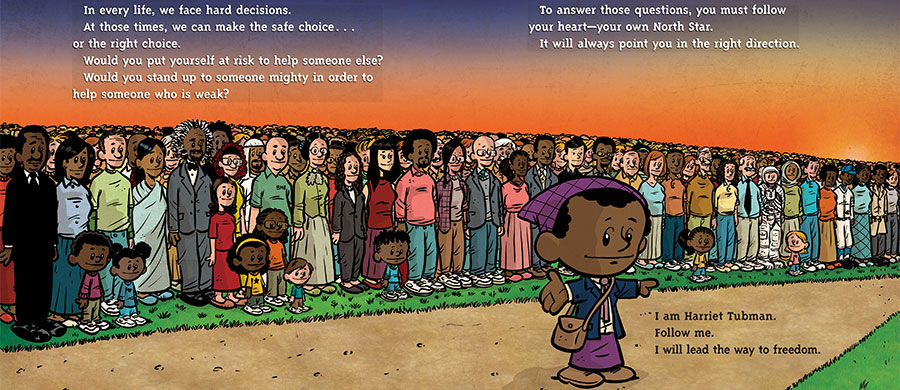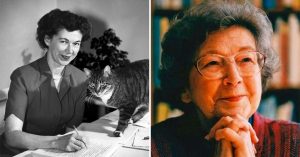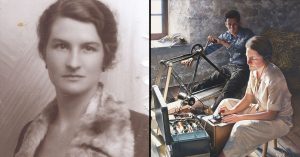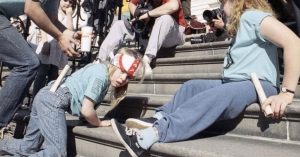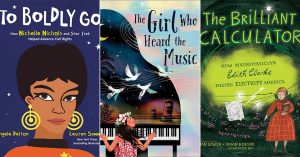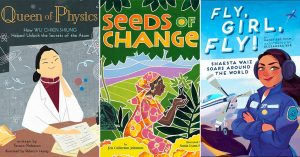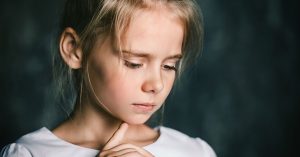"These aren't just the stories of famous people. This is what we're all capable of on our very best days."
For the past four years, Brad Meltzer's best-selling series Ordinary People Change the World has been teaching kids that 'everyone can be a hero' while introducing them to a variety of amazing people throughout history. This week, A Mighty Girl spoke with Brad about the release of his 15th book in the series, I Am Harriet Tubman, what he hopes kids take away from his books, and his plans for the future of the popular series.
To celebrate the new book's release, A Mighty Girl supporters can sign up to win an autographed set of all seven books from the series focused on the stories of Mighty Women. To enter, visit our I Am Harriet Tubman & Ordinary People Change the World Giveaway page.
Our conversation with Brad Meltzer
 A Mighty Girl: Prior to the Ordinary People Change the World series, you were a best-selling author of political thrillers. What inspired you to start writing a series for kids?
A Mighty Girl: Prior to the Ordinary People Change the World series, you were a best-selling author of political thrillers. What inspired you to start writing a series for kids?
Brad Meltzer: I started this because I have my own kids, and I was tired of my own kids looking at reality TV show stars and people who were famous for being famous and thinking that that's a hero. And because of the thrillers I do, because of the History Channel TV show I was doing, I had so many better real heroes for them.
If I tell my daughter that Amelia Earhart flew across the Atlantic Ocean, my daughter goes "big deal Dad, everyone flies across the Atlantic." But if I show her that when Amelia Earhart was seven years old, she built a homemade roller coaster in her backyard, and it's a true story — she shoves the wooden crates to the roof of her tool shed and then puts roller skating wheels on the bottom and comes careening down the side and crashes, and gets up and says something like "That was amazing!" — now my daughter is listening. Now my daughter is like, Amelia Earhart isn't some black and white figure in a history book; to my daughter Amelia Earhart is now bold and she's daring and she's fun.
And I knew in that moment what we had to do: we had to show kids their own power and we had to show things they could relate to. So every book always starts with the hero when they're a child. So these aren't just the stories of famous people. This is what we're all capable of on our very best days.
Along those lines, the characters are presented as children but they also stay childlike in appearance throughout the entire book even during their adult years. What was the thinking behind that, not to show their physical growth into adults?
We tested on our own kids, and our kids responded. Chris and I, when we started the series, both had young kids and our kids liked them when they were younger. They actually get it completely. The message was very conscious; we were very conscious of this. The choice was, we want to show kids that the power is within them. And if you show a kid a full grown adult, they're already done. They tune out immediately, because "Oh, that's some boring old person." But you show them someone just like them, and that it becomes, "Oh, wait, I can do that too.
These people are no different than you: they were kids just like you; they were scared just like you. They had fears just like you, and they overcame them all.
There's a story we did: when Abraham Lincoln was 10 years old, he saved a group of turtles, and my youngest son, when I told him the story, it was like, "I love Abraham Lincoln for saving those turtles!" He didn't care about about the Civil War, he didn't care about the presidency, but he understood what it was like to stand up to bullies who are picking up and torturing turtles. My son, to this day, sleeps with an Abraham Lincoln doll that someone made from one of the books, because Abraham Lincoln is his favorite character that we've done, because he was nice to those turtles.
So when we were doing the books, the publisher said, "Should we do them as adults as they get older?" And I said, "Chris, why don't you draw them — it's not going to work, but why don't you draw them." They said "What do you mean it's not going to work?" and I said, "Watch." And he drew Amelia as she got older, he drew her as an adult, and suddenly it just became another history book and no kid cared about it. But when we kept them as kids, the kids couldn't stop reading them. So we knew right there, that's the best way to impart that core message, which is: here is the power that's in you every day. These people are no different than you: they were kids just like you; they were scared just like you. They had fears just like you, and they overcame them all.
What age do you think your books are for? What age do you write them for?
You know, it's funny: we're on all these educational reading guideline groups as from kindergarten to about third grade as our sweet spot, but my 13 year old reads them and my 16 year old reads them, because they love the stories. And I can't say how many parents buy them for their newborns: I feel like I'm the number one new baby gift! I get all these people who say, "I have a newborn baby and I'm building a library for them. Can you sign this book?" So obviously, when you read them to the kids, I think kindergarten to third grade is really where we are. The New York school district, Wisconsin, all these different states across the country have put us on their read list, and we tend to be in that age range. But, at the end of the day, we all know the country is starving for heroes right now — all of us, on both sides, are starving for heroes. And so we really serve every different age group that has that need.
How do you respond to parents or educators who raise concerns about introducing children that young to topics like slavery? In the new Harriet Tubman book, there are references to her being beaten as a child and, of course, being enslaved and, in the Sacagawea book, she is essentially sold off as a child bride. How do you address introducing young children to such challenging concepts?
Yeah, you know it's interesting, the very first book we did after Amelia Earhart was Abraham Lincoln. Those were the two books we launched with. And with Abraham Lincoln, people were like, "Are you going to discuss slavery?" And we stopped and we thought, what are doing if we're not? Are we just going to say, "He's a great guy, great president! But we can't tell you why, because we're scared you're going to be terrified.
I just felt like we needed to try. We said, "We'll always do it sensitively, and we'll always do it with a lot of thought. We use a lot of educational consultants, and we use people who are specialists in that area. When we did I Am Martin Luther King Jr., John Lewis read the book and one of Dr. King's top lieutenant's daughter read the book for us for sensitivity issues. For I Am Sacajawea, we sent it to the Smithsonian's top Native American museum and an expert there, and we said, "You know you know better than we do the issues of your community." For I Am Helen Keller, we went to the Helen Keller Foundation and I said, "At the end of the day, I'm still a middle age guy writing this. Tell me about the community with disabilities. You have a different set of needs that I'll never ever be aware of, help us find those parts."
It's never been a series about history; it's a series about values. It's a series about how to treat other people and bring back decency and bring back kindness and bring back compassion.
The one thing I found through all of them is that kids are far more resilient than we ever give them credit for and anyone who has more than one kid knows that. We all realize very quickly that our kids are are much stronger than we think. We do try and deal with it sensitively, but doing Harriet Tubman? We couldn't have done this as the first book. We had to earn the trust of fifteen books to do that here. But we were like, should we show that she was beaten? We know we can't show her bloody backside; we don't want kids having nightmares, but we don't shy away from the fact that she was hurt by these people.
And, it always results in the most amazing conversations with your kids. It started with the third book we did, I Am Rosa Parks. A friend of mine and Chris' who has read the book with his daughter: and he's white and he has adopted an African-American daughter, so it's a multiracial family. So he was reading the book with his daughter and they got to the very end, and the last page of the book that you see always has the real photographs of the person, because we want to show people who know who they really were. He said he was reading with his daughter and they finished the book and she says, "Wait, this really happened?" And he said suddenly he was having most important conversation and the first conversation with his daughter he'd ever had about race. One of the hardest conversations you can ever have with anyone, adult or child.
To me, I think if we shy away from it we have bigger problems. I feel like, in a strange way, we're all kind of terrified to say things. But when you deal with kids, they'll ask questions that are amazing. And I think what we did, and the reason we eventually got to Harriet Tubman, is we realize kids can handle it in a certain way. As long as we're being sensitive to their fears and to things that really scared them, that we actually can do these issues.
That's why I think the series works: it's never been a series about history; it's a series about values. It's a series about how to treat other people and bring back decency and bring back kindness and bring back compassion. That's what's missing from the world today, and I think that that's what parents appreciate. And you can't do that with stone cold facts and timelines, you have to do it by showing that the problem is that there cannot be good without evil; there cannot be hope without there being harm. You need those things. So the only way, if you want to teach one — and the reason there is such an uplifting message at the end — is because we do show you what the problem was and then you can come out of it. But the one thing I've realized over and over is that kids can handle it, as long as we deal with it sensitively.
It's a bit like that famous G.K. Chesterton quote, that was paraphrased by Neil Gaiman, "Fairy tales are more than true, not because they tell us that dragons exist but because they tell us that dragons can be beaten."
Absolutely.
In terms of the role models you choose to feature, your books are pretty evenly split between men and women Of course, since we're A Mighty Girl, we're always looking for stories of Mighty Women in history to share with our supporters. In many history series, like in literature, the representation of women is often weak, though we've seen a definite improvement in this over the past few years. Was having balanced gender representation in the Ordinary People Change the World series an intentional decision on your part? And, if so, why do you feel it's important to make sure that women's stories are represented?
The easy and obvious answer is I have a daughter, but if I didn't have a daughter, I'd do the same. My first heroes book I did was called Heroes For My Son, and it's filled with women. I don't care if I have a daughter or not; that's called being a person with a brain in your head. It's half the population; why should they not be present with all these amazing stories? I want my sons to read every one of these books about a so-called mighty girl and I want my daughter to read every one of these about a so-called mighty boy. And to me, it's not a choice of "oh, we have to even it out," or "we're going to lose sales" or anything that's callous like that; it's simply because that's how the world worked. There are amazing stories whether you're a man or woman, on both sides. I just pick the people I like.
I feel like, that's just a great story that's out there, and that's how history happened. There were great men and there were great women. There were Founding Fathers but there were also Founding Mothers. If you study the American Revolution, Abigail Adams was hosting all these soldiers in her house, making sure that they were all fed and taking care of them, making sure they had ammunition, all these amazing things. But for some reason, we focus on the Founding Fathers — what, like they were all alone? No. So, to me, this is our way to correct that history. That's what happened. That's right.
Shifting gears a bit, we have a lot of new and aspiring writers in our community and I think many would be interested to hear about your writing process. How do you go from choosing a subject to completing a story?
To me, you know, I write thrillers where I murder people all day long, and than I write kids books for little children. Then I have to go to work on a TV show script, and then I have to go to a comic book starring Superman or Batman, and it those seem like all varied genres, but they're all the same, because a good story is a good story. That's what you have to find, whatever genre you work in, whether it's picture books or adult thrillers or anything else in between, a good story is a good story. To me it comes back with the Supreme Court definition of pornography, which is "you know when you see it," right?
When I'm doing these books, my process is very simple: I pick someone that I admire, and that's what I really do, I start with that, and then I go and see that they live up to the hype. Amazingly, the people that you love the most, so far, they really do. They have more amazing, complex stories than you ever would think they have.
But you know there have been thousands upon thousands of books written about Jane Goodall. I think the reason Jane Goodall herself selected our book and pulled this out and said, "This is an important book," is because we found the best of her story and the core of her message. You could find a million books of 400 pages long, and your kids aren't going to read them. But when you find that story, like when Jane Goodall was a little girl and the little club she used to have where she loved animals so much and had these code names, and these amazing books that she would be fill with information, those are the things that I think kids take to, and they realize, "Oh, that's the really fun part of the story.
Like Elmore Leonard says, and I'm paraphrasing, when you become a writer, you take out all the parts that people don't want to read and you have to give the parts they do want to read. That's what I feel like my job is, I've just got to find the core of the story and the core of the person that makes you love them. And it's always a thematic one. Jane Goodall's story is not just about animals, it's not just about that she was a woman, it's not just about that she was bold or daring, but it was about that she really, in her own way, had this amazing impact that we can all apply to our lives when someone says no to you. I mean it is to push forward and to blaze your own trail and that thing you love and to find what you love and keep pushing forward and what you do.
That's not just for Jane Goodall; that's for anyone who has a passion in your life and that's what I can teach my daughter. Yes, my daughter may want to start reading Jane Goodall because she loves animals, she loves our dog, but when she finishes, she is charged up to change the world because she's thinking, "she would never take a no for an answer." That's the bigger message, is trying to find the core of that person so they can find and then blaze their own trail.
A lot of your books have been focused on very prominent historical role models like Jane Goodall. From the work we do at A Mighty Girl collecting the best in girl-empowering literature, we see many picture books come out every year focused on famous figures like Jane Goodall or Rosa Parks or Harriet Tubman. There has also been a recent trend where we are seeing more and more picture book biographies about lesser known figures. Why do you choose to focus on more of the big historical figures versus bringing out some of the stories of lesser known but influential individuals — or do you plan on featuring more of these types of stories in the future?
Heroes For My Daughter was the first one we did, and I would say about 75 percent of the people in that book you knew. there was Amelia Earhart and there was Rosa Parks and there was Jane Goodall. But we filled it with people no one's ever heard of; we put Wilma Rudolph in there, We're putting all these people you've never heard of — including my 9th grade high school English teacher — so we wanted the full range. You don't have to be famous to be a hero. To me, if these books stand for anything, it's the exact opposite of that. It's the idea that we can all do something amazing, we all have that power.
So the answer is, I want to do everybody! When we first pitched the series and there were saying, "oh, great, Amelia Earhart and Abraham Lincoln. That's great. How many do you want to do, like 10? Or 12 or 15?" And I want to do a hundred. I want to get to the point where eventually you hit that tipping point where you've never heard of anyone. I would love to do Wilma Rudolph. And I am serious. I'd love to do any of these people. The goal is to get people to go, "Who is that? Because I just want to know now. I trust you enough. And now whoever it's going to be, I know I'm going to be in for a great story." I just think it's a harder time to do that when I still haven't done Billie Jean King yet, you know, amazing people that I still want to get to. So the list is spectacularly long but it includes everyone that you're talking about.
I understand this list is massive so how do you decide who is going to be the next one?
I wish we had some great science and we were so smart and we looked at demographics, but the truth is we choose who we want to tell a story about. When you read a book you love and you just can't get enough of, you can see all the author's energy. It's coming off the page. It's a little like you feel like the train is moving, it's leaving the station, and you just want to hang on because it's going somewhere.
And that X Factor, to make you feel that, I truly believe, takes: does the author love what they're doing? Are they passionate about what they're doing, and if they are, it shows on every page turn. I don't go, "You know what I need? A Hispanic woman whose name starts with a vowel because we haven't done that, and now we're going to need a man who's Asian." We're not checking boxes; what we're doing is just find the people that we think are amazing. Of course, we're trying to space it out so that we had different moral lessons. I mean, we did Jane Goodall flat out because I wanted my daughter to have a female scientist. Period. And I knew that she would love and respond to that.
I want to do Mr. Rogers so badly, but we just did Jim Henson. I can't do Mr. Rogers right after Jim Henson, but we'll get there. I needed to get someone who was enslaved; I have to talk about slavery, so I knew I wanted to do Harriet Tubman. I want to do an astronaut, so an astronaut's coming next. Because I want to do someone who's in space. The only boxes that we check are the things that I really want to teach my kids about.
Are you able to reveal who's next?
Some of these clues may tell you what we're doing! I Am Neil Armstrong is coming next. Chris Eliopoulos, our artist, has been begging to do him since book one. I held him up and I was like eventually we'll get to him! So yeah. Neil Armstrong's come in.
I'm dying to do Sally Ride. Sally Ride is, I think, the second hero in Heroes For My Daughter, and she's one of my favorites of all time. I was like, "OK, what do we do? We got an astronaut; do we do Sally Ride first or do we do Neil Armstrong?" That's hard, but then I thought, "If I can do that, then I can do Marie Curie, and I don't have three female scientists, and that's probably a better way to do it." Really all it comes down to is, can I pick all the different versions of all these different jobs that I want to eventually get.
Yes, Marie Curie is surprisingly one of the female scientists out there without very many good picture books about her, at least not recent ones.
Yeah, I love that we get to do these. I love that people trust us. We've had this real great trust with our audience. The goal for this series has never been about, here's a book about Rosa Parks and here's one about Lucille Ball and here's one about Helen Keller. It's about helping people build real libraries of real heroes for their kids and grandkids and nieces and nephews. When we started people wondered, "If you do someone who's African American, are you going to go to the African-American media?" And I thought, no. People want good heroes. Trust me. And now I sell just as many Rosa Parks as I'm selling Amelia Earharts. I love that people are just trying to build something bigger for their kids.
Yes, we've certainly seen that trend. There's a lot more diversity coming out in children's biographies right now. And, there certainly seems to be demand for them.
We know why. Listen, it's because the country is starving — we're starving for heroes for kids. We are. It's not a Republican or Democrat thing. I literally go from NPR to Fox News talking about these books. I'm like one of the only thing that crosses back and forth. And it's just because people feel like we've lost sight of it. It's crazy to me. But the one thing we actually agree on is that our kids need better values today because we're certainly not seeing them on it TV. We're all tired of seeing politicians on TV and we know that there's a giant difference between a politician and a leader. And we're tired of seeing politicians when what we need to see are leaders.
I believe in regular people and their ability to affect change on this world.
What do you hope kids most take away from the series?
It's exactly what's on the front cover of the book. It is my core beliefs. I believe ordinary people change the world. I don't care where you went to school. I don't care how much money you make, that is all nonsense to me. I believe in regular people and their ability to affect change on this world. That's why I believe in a 7-year-old Amelia Earhart and 10-year-old Abraham Lincoln and a little girl named Lucille Ball and a little Jane Goodall. I believe in their power not just because they're famous but because of what they did when they were kids.
If there's one thing I've learned after all these books it's that everyone you admire in your life, every person you think is amazing, at some point in their life was scared and terrified and worried and thought they couldn't do it and they choose to find the strength and move forward. If the kids take away one thing, it's that they see that. Just that.
Are there books you recall having a particularly big impact on you as a child?
Oh number one, bar nothing Judy Blume. Number one. Judy Blume changed me as a reader as a writer. I remember Super Fudge and Tales of a Fourth Grade Nothing to Are You There God? It's Me Margaret. In one of my thrillers, there's a character named Fudge who answers the phone "Are you there God? It's me Billy." That character is obsessed with Judy Blume because I am. As a young boy I loved reading about how she wrote about women and young girls. The best thing about books, as someone said so much smarter than myself, is they give you a chance to look through someone else's eyes. That's what Judy Blume always did for me.
Agatha Christie also changed my life. That's why I'm a mystery writer today, it's because of Agatha Christie. And comic books. I love Superman and Batman and those characters. To me, the most important part of the story was never Superman. The most important part of the story is Clark Kent. Because we're all Clark Kents. We all know what it's like to be boring and ordinary and wish we could do something incredible beyond ourselves. And we all can. Because all you have to do is be nice to one person. Be kind to one person that's the answer. Those are the lessons I got in those stories back then.
I think many of our supporters would be excited to learn of the influence that Judy Blume in particular had on you, since she's so popular with our community.
Oh my God. I got to introduce her one time when I was on a Texas TV show. I got to leave a note for her and she left a note back and I was like oh my gosh. Anyway, she knows my obsession with her. In an interview, when they ask about my favorite writers, for 20 years you'll see Judy Blume's name in there.
You know a tremendous amount about history given your background and you now write a series about famous role models from history. Who are a few of your favorite historic Mighty Girl role models?
Listen, it's tough to beat Rosa Parks.
I did Lucille Ball because I wanted my daughter to have a female entertainment hero who wasn't just famous for being thin and pretty. Jane Goodall lives up to all the hype and we got to talk to her while we working on the book which was a dream come true. Helen Keller is an unstoppable ass kicker. I mean unstoppable at every level.
This is in line with the people you've featured in your books obviously.
I am just naming them, right?
I mean here's the thing. We all know Harriet Tubman is supposed to be in the echelon. I had no idea of what she risked, and I always thought the whole thing was about escape. I thought that the whole thing was about escaping, and it's not. Maybe I'll leave you with this. This is my favorite line of the book.
"The measure of success isn't what you achieve for yourself, it's what you do for others. Think of yourself as a bird. Some days, you'll climb high; some days, you'll fall. But when you pass the clouds and reach the top, you have a choice. You can stay up there and enjoy the view — or you can go back down and bring others up to join you."
She stands for this and here's the final line. It says you must follow your heart your own North Star. It will always point you in the right direction. And I think today as a culture we've kind of lost our North Star. And Harriet Tubman used to always tell the story we tell in a book about her father taught her about the North Star to kind of realign herself into following it. We need to re-find our North Star and we need to follow it. So that's always one of the best ones from me.
That's fantastic. And I think it's also amazing that you've essentially been able to write books about all your personal heroes.
It's not a coincidence. I can do this forever. I really like Abigail Adams, I can do Billie Jean King… I'm just trying to think off the top of my head of the ones we didn't do purposely. Marie Curie is amazing. Eleanor Roosevelt. The list is endless for me. Wilma Rudolph, I love, which is why I mentioned her before. Amazing story. The good part is the list is long.
Most of your books are about Americans with a few exceptions…
Yeah, but we're going international too. I want to do Winston Churchill. There's plenty out there that I want to do. But if you're going to spend all this time doing it, you might as well pick the people you love. This series started as a gift to my own children. So it was inherently a selfish project. It was for me and my kids. But if everyone else wants a copy, great. I just love that people have come along. That's been the best reward.
Were you surprised at the reaction and tremendous response it's generated?
Here's the one thing it taught me, and it's a lesson I learn over and over and over in my life as a writer. I am not that special. If I like something, if I'm passionate about something, one thing is true. There are thousands and thousands of other parents out there who love this thing too and want something amazing for their children and want their kids to have heroes too. That's all it proved. It's not that I have some kind of great taste. It's just that I want that same thing for my kids that we all want for our kids. We want them to have someone good to look up to in this world where there's so much bad to look up to.
Especially in these times…
Amen. More than ever. This series has basically doubled in the last year. Ever since the election, I Am Dr. King and I Am Rosa Parks took off, and you know why… It's pretty obvious. We're looking at these politicians and know we need better leaders.
